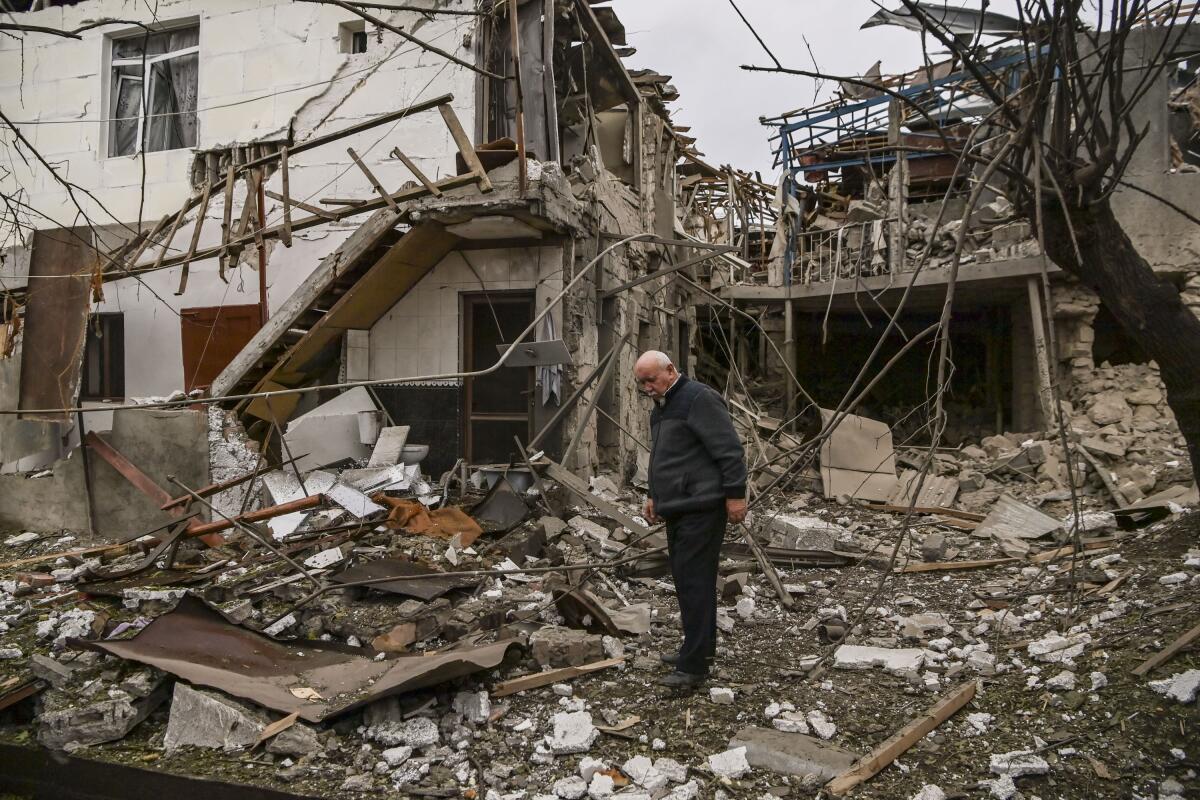Editorial: In the South Caucasus, the threat of war

- Share via
Armenia and Azerbaijan are on the brink of war over the disputed territory of Nagorno-Karabakh. The violence, which began on Sept. 27, has claimed the lives of more than 100 civilians and driven thousands more from their homes. It is the most serious conflict between the two former Soviet states since they signed a 1994 cease-fire agreement, not long after the breakup of the Soviet Union. The conflict threatens to draw in the dominant powers in the region — especially Russia and Turkey, but also possibly Iran.
Both sides should heed the United Nations Security Council, which has condemned the violence. They should listen to Secretary-General António Guterres, who on Tuesday called on the combatants to protect civilians and civilian infrastructure (as international law requires), cease hostilities and return to meaningful negotiations.
Nagorno-Karabakh is a landlocked region of about 1,700 square miles, slightly larger than the state of Rhode Island. The Soviets established the autonomous region — overwhelmingly populated by ethnic Armenians, who are mostly Christian — within the boundaries of Azerbaijan, whose citizens are mostly Muslim.
Lawmakers in Nagorno-Karabakh called for joining Armenia in 1988, but as the Soviet Union dissolved in 1991, the status quo also dissolved, and the region declared independence. Violence erupted, claiming about 30,000 lives and displacing hundreds of thousands of ethnic Azeri refugees. Armenia ended up with de facto control of Nagorno-Karabakh and a part of the surrounding territory of Azerbaijan. Russia brokered a cease-fire in 1994 that remains in place. But no peace deal has been signed, and violence has sporadically flared, most recently in April 2016 and July 2020.
The latest violence is not only heartbreaking; it’s also a matter of global security because it threatens to escalate into a regional conflict. Russia signed a defense pact with Armenia in 2010 and supplies weapons to both countries. Azerbaijanis (also known as Azeris) are a Turkic ethnic group; Turkey, which has maintained an economic blockade against Armenia since 1993, has vowed to support Azerbaijan. Complicating matters, Iran has a large Azeri minority, and Azerbaijan is a strategically significant supplier of oil and natural gas.
Leadership — or the lack of it — matters. Azerbaijan’s long-serving foreign minister, Elmar Mammadyarov, a stabilizing figure, retired over the summer. Armenia’s prime minister, the former journalist Nikol Pashinyan, has taken a hard line on the conflict. So has Turkey’s leader, Recep Tayyip Erdogan, who vowed on Friday: “God willing, until Nagorno-Karabakh is liberated from invasion, this struggle will continue.”
The horrors of the past loom over the present. Members of the large Armenian community in Southern California have protested in recent days, pointing out Turks’ systematic murder and expulsion of Armenians starting in April 1915, in the shadow of World War I. Those atrocities have been recognized by the international community — though not by Turkey — as the Armenian Genocide, a horrifying precursor to the mass exterminations of the Holocaust and to 20th century genocides from Rwanda to Cambodia. How many people died is not known precisely, but most estimates fall between 600,000 and 1.5 million.
The current flare-up threatens to turn into an all-out war. Each side has accused the other of unprovoked aggression. Russia and Turkey should avoid adding to the conflict — though that may be wishful thinking, given that both countries are led by authoritarian strongmen who use nationalism to promote their domestic agendas.
The surest way to prevent the conflict from broadening into a fight between major powers is for Armenia and Azerbaijan to return to the negotiating table and renew their commitment to the Minsk Group, a mediation effort begun in 1992 by the Organization for Security and Cooperation in Europe to address the dispute.
Diplomacy can be lengthy and frustrating, but it is always preferable to the use of force. With the right mix of incentives, political will and international support, seemingly intractable conflicts can be resolved. Witness, for example, last year’s agreement between Greece and the former Yugoslav republic of Macedonia, resulting in a newly named North Macedonia, which joined NATO in March and is on a path to joining the European Union.
The current conflict is a reminder of the consequences of the United States’ diminished role on the world stage. Secretary of State Michael R. Pompeo has rightly joined his counterparts in France and Russia in calling for a cessation to hostilities, but the United States has less credibility and effectiveness due to the continuing turmoil within the Trump administration and its shift toward an “America First” foreign policy, which has turned this country profoundly inward. America cannot be the world’s policeman, but its shambolic disengagement from most of the rest of the world has been a terrible blow to the international order.
More to Read
A cure for the common opinion
Get thought-provoking perspectives with our weekly newsletter.
You may occasionally receive promotional content from the Los Angeles Times.










